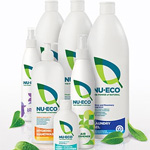
Blog
Chemicals in the Cleaning Industry
July 21, 2020

Taking care of your health is the most important thing you can do for yourself. Maybe you mediate, eat a balanced diet, exercise daily or follow some other routines to keep your body and mind well, but there’s more to health than just our routines. The fact of the matter in today’s society is that we are often exposed to pollutants and toxins that can have very serious consequences on our health – no matter how much effort we put unto taking care of ourselves. Unfortunately, this is also true of many of the products used in cleaning. Indeed, many chemicals in the cleaning industry have been shown to deleterious effects on our health from causing respiratory illness to cancer. So what do you need to know about chemicals in the cleaning industry to be sure that your home and business are introducing us to health risks?
First, it’s important to understand that even though a company advertises its products as environmentally friendly and sustainable, does not mean their products are harm free. Indeed, the majority of household cleaning products are likely to contain industrial chemicals such as formaldehyde or dioxane (known carcinogens), just as an example. Some chemical ingredients in cleaning products have mild health effects such as skin or eye irritation, while other are associated with more serious effects including respiratory illness, central nervous system damage, and even cancer. Moreover, not only are we exposed to these chemicals in the products we use, but when they are washed down drains they enter our water treatment systems and eventually may get into our ground water.
So, how can you protect the people you care about from dangerous chemicals in the cleaning industry? First, seek out independent reviews of cleaning products to learn more about particular brands and their products. For example, the Environmental Working Group independently reviews and rates cleaning products and their ingredients so that consumers can be more confident in their purchasing choices. Avoid products that contain ingredients such as formaldehyde, 1-4 Dioxane, polyethylene, polyethylene glycol, polyoxyethyelene, polyoxynolethylene, and other chemicals with “-eth” and “-oxynol” suffixes. Finally, pay close attention to changes in your own health when using different products – for example, if you notice even mild skin irritation or irritation in your eyes or throat, discontinue using those products.
Ultimately, it can be very difficult to know which products are safe for cleaning when it comes to maintaining our health today and into the future. It is our responsibility to be a conscious shopper and carefully research our cleaning products to ensure that we are not exposing ourselves, our families, and our friends and colleagues to dangerous chemicals that are all too often used in the cleaning industry.

